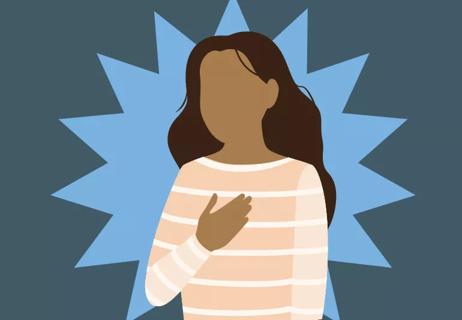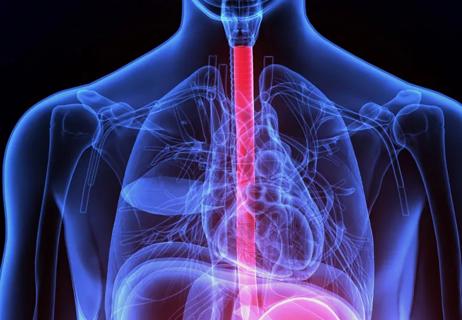If you have other cardiac symptoms, and antacids aren’t working, it’s time to call emergency services

It’s frustrating, but true: The main symptoms of heartburn and a heart attack can be nearly indistinguishable — so much so that emergency responders often have to run tests to determine which condition you’re experiencing.
Advertisement
Cleveland Clinic is a non-profit academic medical center. Advertising on our site helps support our mission. We do not endorse non-Cleveland Clinic products or services. Policy
If healthcare professionals can’t always tell the difference between a life-changing medical event and a bad case of acid indigestion, how can you? Interventional cardiologist Laura Young, MD, shares some tips — and stresses that it’s always better to be safe than sorry.
Both severe heartburn and heart attacks cause chest pain. But as your esophagus (where you feel heartburn) is so close to your heart, it’s often difficult to tell where the pain is coming from.
It can be even harder to tell the difference if you have a preexisting medical condition, like gastroesophageal reflux disease (GERD), that causes frequent bouts of acid indigestion.
Dr. Young says these are some of the best ways to distinguish between heartburn and a heart attack.
Chest pain can present in many different — and unexpected — ways, depending on what’s causing it.
When you think of a heart attack, you may picture a person clutching their chest in agony. But Dr. Young says it isn’t always that dramatic — especially for women or if you have diabetes.
Chest pain from a heart attack can feel like:
With heartburn, the name says it all. The chest pain you get feels like:
Advertisement
If you aren’t sure whether the pain in your chest is coming from your esophagus or your heart, zoom out and focus on any other physical sensations you’re experiencing. That should help you better distinguish between heartburn and a heart attack.
According to Dr. Young, the following symptoms suggest you may be having a heart attack, not severe heartburn:
Meanwhile, common signs that point to heartburn include:
One of the key differences between heartburn and a heart attack is the fact that a heart attack won’t stop when you take medicine, including aspirin.
When you have a heart attack, it’s because one of the coronary arteries that provides blood to your heart is fully or partially blocked. That blockage is obstructing the flow of blood and oxygen to your heart. And there’s nothing in your medicine cabinet that will resolve it.
“Your symptoms will continue until that blockage is cleared,” Dr. Young clarifies.
Heartburn, on the other hand, should respond to medication like antacids.
“It’s important for a doctor to rule out a heart attack if heartburn medications like proton pump inhibitors or over-the-counter antacids aren’t relieving your symptoms,” she stresses.
If you’re not sure whether you’re having a nasty bout of heartburn or a heart attack, it can be helpful to put your symptoms in context. Ask yourself these questions:
Advertisement
Act fast and err on the side of caution if there’s a chance something could be happening to your heart. As cardiologists sometimes say, “time is muscle.” So, don’t take more than a few minutes to decide to pick up the phone.
“Ignoring your symptoms, or trying to wait them out, is the worst thing you can do,” Dr. Young states. “Call 911 and get checked by a medical professional. If you’re having a heart attack, acting fast is key to stopping the damage and preventing long-term health effects.”
If you think you’re having a heart attack:
Dr. Young has one last reminder: It’s OK to be wrong. If you can’t tell whether you’re experiencing heartburn or having a heart attack, seeking help is the right choice.
“We don’t want you to have a heart attack,” Dr. Young emphasizes. “And we won’t be upset if it turns out you actually had a bad case of heartburn. It’s hard to tell them apart sometimes, and it’s always better to be safe than sorry.”
Advertisement
Advertisement

Sign up for our Health Essentials emails for expert guidance on nutrition, fitness, sleep, skin care and more.
Learn more about our editorial process.
Advertisement

From heartburn and panic attacks to muscle spasms and heart attacks, lots of medical conditions can cause chest pain

Feelings of stress or anxiety can cause an increase in hormones and a tightening of the chest muscles, which can lead to chest pain

If your provider has ruled out a serious cause, you can treat chest pain at home with antacids, inhalers or anti-inflammatory medications

Don’t ignore chest pressure that lingers and can’t be explained

Not all chest discomfort is a symptom of a heart attack

Why the condition, also called jackhammer esophagus, is missed

Exerting yourself in cold temperatures increases your risk of a cardiac event

Strokes affect your brain, while heart attacks affect your heart — both can be life-threatening emergencies

Even small moments of time outdoors can help reduce stress, boost mood and restore a sense of calm

A correct prescription helps your eyes see clearly — but as natural changes occur, you may need stronger or different eyeglasses

Both are medical emergencies, but they are very distinct events with different causes